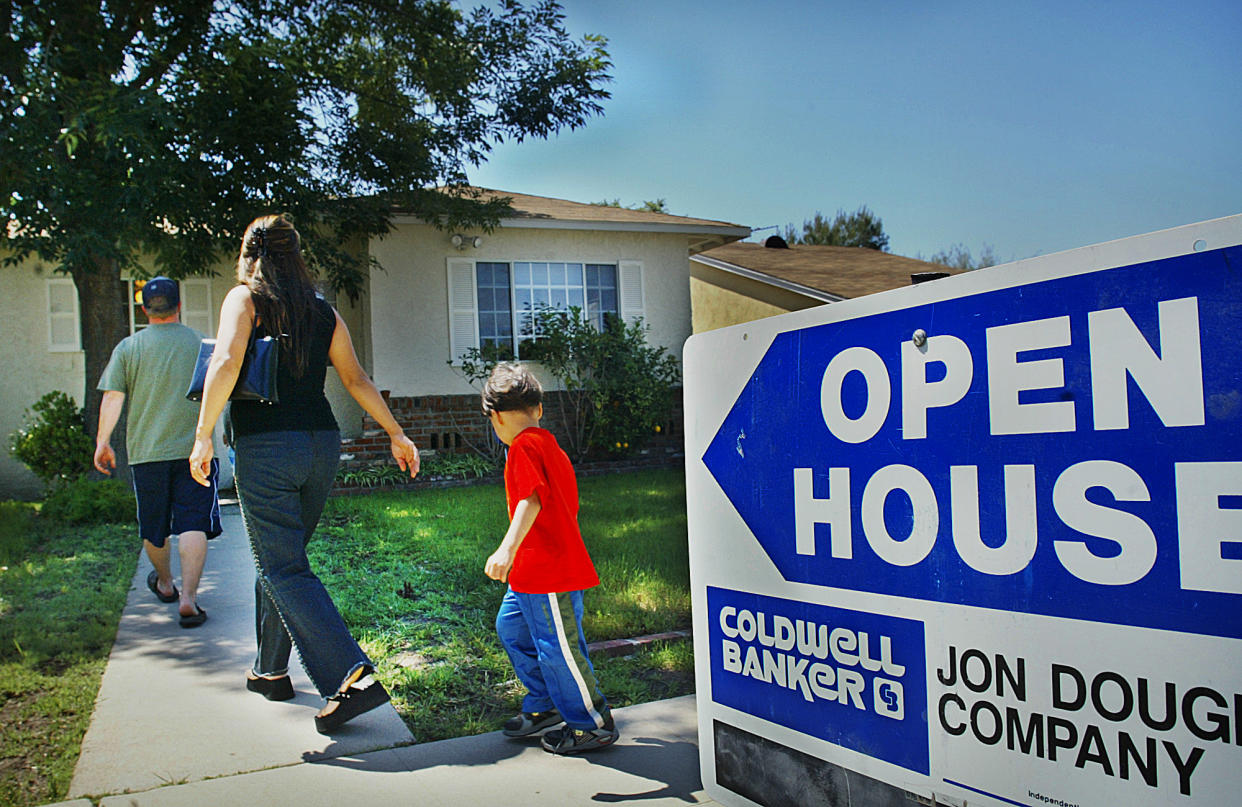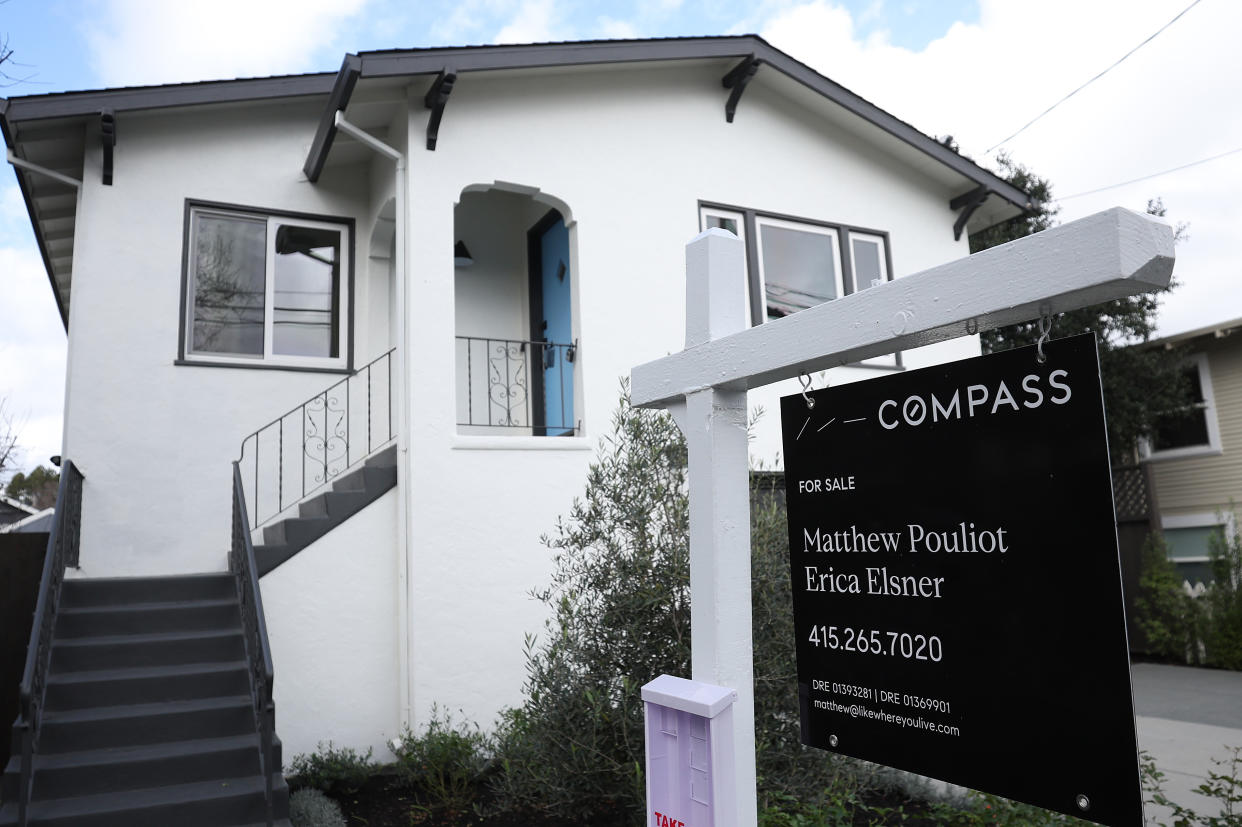Mortgage demand wilts after rates briefly top 7%, according to daily index
Homebuyer demand languished as mortgage rates briefly topped 7% for the first time since mid-December last week before settling back below that mark, according to a daily measure of rates.
The average rate for the 30-year fixed mortgage catapulted from 6.63% on Feb. 1 to a high of 7.04% on Monday, according to Mortgage News Daily index. As of Thursday, the average rate had inched down to 6.95%.
A separate measure of rates showed more modest week-to-week movement. According to Freddie Mac, the 30-year fixed mortgage reached 6.64% on Thursday, up from 6.63% the week prior.
The uptick came as Federal Reserve officials signaled they would likely hold off on cutting its benchmark interest rate until they were more certain inflation was cooling.
The central bank’s delayed stance on reducing borrowing costs came after a stronger-than-expected jobs report last week. While a strong labor market is good for buyers, too much wage growth can lead to higher inflation, which policymakers have been trying to rein in for more than a year.
For rate-sensitive buyers, any volatility in mortgage rates is a blow to their affordability. Still, confidence in the housing market hasn’t completely crumbled as some would-be borrowers remain optimistic about the possibility of rates softening later this year.
"Homebuyers may be feeling like the lower rates they’ve been promised in 2024 are not materializing," said Lisa Sturtevant, Bright MLS chief economist. "It’s definitely true that rates have been bumping around to start the year."
Read more: Mortgage rates below 7% — is this a good time to buy a house?
'Buyers need to act quickly'
As rates tilted higher last week, some would-be buyers hit the brakes on their purchase plans.
Purchasing applications decreased 1% on a seasonally adjusted basis for the week ending Feb. 2, the Mortgage Bankers Association’s survey found. Overall, purchase activity remained 19% lower than the same week a year ago.
While the MBA’s weekly survey does not reflect the sudden uptick in rates, the reality is that rates are only part of the equation. Continued weakness in the housing market in other crucial areas — particularly inventory — has been the source of stress on homebuyer affordability.
"Homebuyers should expect mortgage rates to move lower as we head through 2024, but that does not necessarily mean it will be easier to buy a home," Sturtevant said. "There is still very low inventory in the market, and buyers need to act quickly when they find the right home for them."

According to Realtor.com, there were 8% more homes actively for sale on a typical day in January compared to the same time last year. But while inventory of homes for sale was much improved compared to the previous three years, that figure was still down nearly 40% compared to typical 2017 to 2019 levels.
As a result, the cost to purchase a home also continued to increase last month — albeit at a slower pace.
The national median list price remained essentially level at $409,500 in January compared to $410,000 the month prior, according to Realtor.com. Still, the median list price grew by 1.4% from a year ago due to tight inventory.
Homebuilder discounts are at work, too, but the window on those incentives may be closing.
Read more: Should you pay for mortgage discount points? 4 tips on how to decide.
For instance, in January, 31% of builders reported reducing home prices, the lowest rate since August. The average price reduction remained at 6%, according to the National Association of Home Builders (NAHB). Meanwhile, 62% of builders provided some form of sales incentives last month, relatively unchanged since October.
Sturtevant added: "Waiting to buy later this year might mean a buyer can get a lower rate, but prices are still rising, and inventory will still be tight, which means the market will still be competitive."
Homebuyers are cautiously optimistic
Homebuyers haven’t felt this confident in the housing market in nearly two years, even though the direction of rates has failed to dip as expected.
A measure of homebuyer confidence found that a survey-high 36% of respondents indicated that they expected rates to decrease within the next year. According to Fannie Mae, 28% of folks surveyed in January said they expect rates to go up, while 35% predict rates to remain the same.
"For the first time in our National Housing Survey’s history, a greater share of consumers believe mortgage rates will decrease over the next year, rather than increase," Doug Duncan, Fannie Mae senior vice president and chief economist, said in a statement. "Consumers also expressed greater confidence in their jobs situation this month, another sign that housing sentiment may continue to improve in 2024."

Despite the improved sentiment in regard to job security and rates, consumer perceptions of homebuying conditions remained overwhelmingly pessimistic. Only 17% of consumers said January was a good time to buy. By comparison, 83% of surveyed respondents said it was a bad time to buy — near historical lows.
As for home price outlook, 37% of respondents said they believe prices will increase within the next 12 months, while 22% expect home prices to soften. Additionally, fewer than 1 in 5 respondents said they expected their household incomes to be significantly higher this year, while 13% expected lower wages.
"While home affordability may improve if actual mortgage rates continue moving downward, other parts of the affordability equation have yet to ease or improve for consumers," Duncan said. "Until we see a meaningful increase in housing supply, we expect affordability will remain a significant barrier to homeownership for many households."
Gabriella is a personal finance and housing reporter at Yahoo Finance. Follow her on X @__gabriellacruz.
